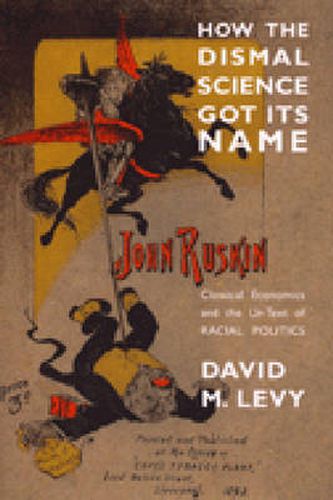How the Dismal Science Got Its Name: Classical Economics and the Ur-Text of Racial Politics
David M. Levy

How the Dismal Science Got Its Name: Classical Economics and the Ur-Text of Racial Politics
David M. Levy
It is widely asserted that the Victorian sages attacked classical economics from a humanistic or egalitarian perspective, calling it the dismal science, and that their attack is relevant to modern discussions of market society. David M. Levy here demonstrates that these assertions are simply false: political economy became dismal because Carlyle, Ruskin, and Dickens were horrified at the idea that systems of slavery were being replaced by systems in which individuals were allowed to choose their own paths in life. At a minimum, they argued, we white people ought to be directing the lives of them, people of color.
Economists of the time argued, on the other hand, that people of color were to be protected by the rule of law–hence the moniker the dismal science.
A startling image from 1893, which is reproduced in full color on this book’s jacket, shows Ruskin killing someone who appears to be nonwhite. A close look reveals that the victim is reading The Dismal Science.
Levy discusses this image at length and also includes in his text weblinks to Carlyle’s Occasional Discourse on the Negro Question and to Mill’s response, demonstrating that these are central documents in British classical economics. He explains Adam Smith’s egalitarian foundations, contrasting Smith’s approach to the hierarchical alternative proposed by Carlyle. Levy also examines various visual representations of this debate and provides an illuminating discussion of Smith’s katallactics, the science of exchange, comparing it with the foundations of modern neoclassical economics.
How the Dismal Science Got Its Name also introduces the notion of rational choice scholarship to explain how attacks on market economics from a context in which racial slavery was idealized have been interpreted as attacks on market economics from a humanistic or egalitarian context. Thus it will greatly appeal to economists, political scientists, philosophers, students of Victorian literature, and historians.
David M. Levy is Associate Professor of Economics and Research Associate, Center for Study of Public Choice, George Mason University.
This item is not currently in-stock. It can be ordered online and is expected to ship in approx 4 weeks
Our stock data is updated periodically, and availability may change throughout the day for in-demand items. Please call the relevant shop for the most current stock information. Prices are subject to change without notice.
Sign in or become a Readings Member to add this title to a wishlist.


